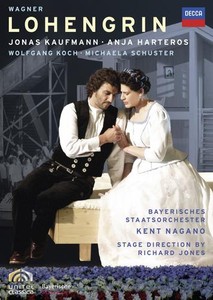
At the if-you're-somebody-you-have-to-be-there level, the big-ticket
item in opera this summer was the Bayreuth Festival's new production of
Wagner's Lohengrin, with the more-handsome-by-the-day Jonas Kaufmann in
the title role. To gander at the stills, the comely Kaufmann looks a
trifle bored among the lab rats with which the animal-fetishistic
director Hans Neuenfels littered the Festspeilhaus stage. I suppose
that's one way to take attention away from that pesky swan Wagner left
directors to deal with, but maybe, as everyone said, you had to be
there.
Those of us who could not bip off to Bavaria in our
private jets got a juicy consolation prize by way of Decca's nearly
simultaneous release of a DVD of Kaufmann's debut in the role in the
Bavarian State Opera's new Lohengrin last summer. Its director, Richard
Jones, knew better than to try to get between Kaufmann's virility and
the people who love it, but, that said, he did put the tenor and the
entire cast in a thought-provoking production that at least didn't
trivialize the work. Perhaps oddest of all, it just let the swan be
there, plunk, as a no-doubt-about-it swan right where Wagner specified.
Jones places the story in a society in what feels like
between-the-world-wars Germany, a state in a proto-totalitarian stage of
seeking a new leader. His production – realized on the stage by the
cryptically named designer Ultz – works well at the level of telling a
story his Munich audience might relate to. It has all the consistency
Wagner's highly problematic libretto allows.
Ultz's signature
stage pictures feature mostly flat planes in strong, saturated though
not quite primary colors. There's a nod toward the traditional Lohengrin
soft blue, but here the centerpiece is the white brick house Elsa is
building, brick by brick, in her coveralls, as she awaits with
supernaturally focused patience the arrival of the man of her dreams –
who, when he does arrive, helps with the bricklaying.
Jones'
concept made the role of the Herald – here the propagandist public voice
of an Orwellian authority, keeping a cowed public "informed" from behind
a big, cobalt microphone – make sense to me for the first time. Where
the sharp-lined pictures go blurry for me is in the way the production
depicts the contenders for leader of this anxious herd all too eager to
be governed.
Ortrud and Telramund, usually presented with almost
cartoonish, Boris and Natasha unalloyed, oozing malevolence, are a
comparatively bland couple here, and any sense of Ortrud's being from
the dark side is sacrificed to her almost glow-in-the-dark blond wig,
which all but screams Aryan. Who are these people? It's hard to take
them seriously, and it doesn't help that the singers, Wolfgang Koch and
Michaela Schuster, lack zoots and are little more than obedient to the
notes and the stage direction.
Wagner's quandaries are greater
than Jones and Ultz could either solve or complicate, but at
least Jones keeps us on the line while the ravishing performances by
Kaufmann and Anja Harteros, as Elsa, play out. They are the dark,
smoldering beauties of this production, though you wouldn't for an
instant miss that they're German. But the purity they exude is not the
Aryan variety, and singing as sensitive yet intense as these two offer
comes along once in a decade, if that. Kaufmann's "In fernem Land" is
pure transport, sung as if on a single breath, hushed and heroic in one
long, smoldering arc.
|